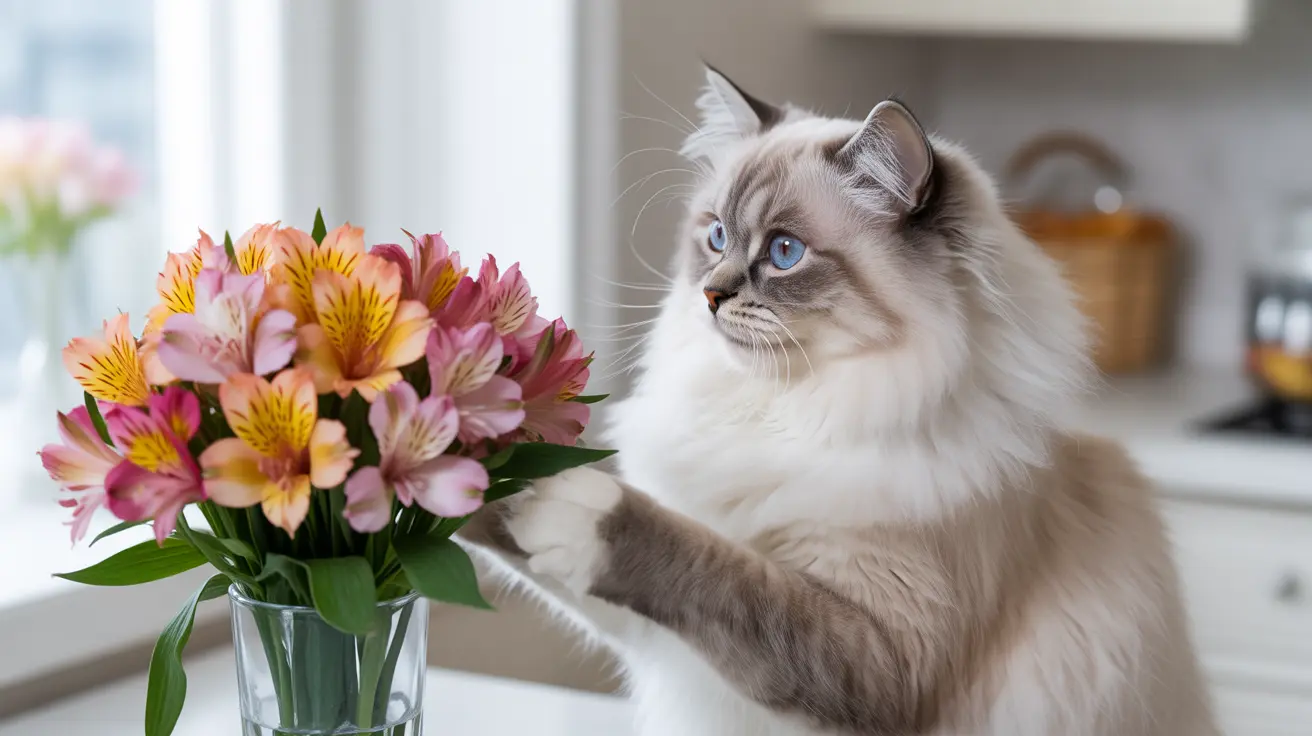Understanding Alstroemeria and Its Effects on Cats
Alstroemeria contains two main compounds that can affect cats: insoluble calcium oxalate crystals and tulipalin A. While these substances can cause discomfort, they're significantly less dangerous than the compounds found in true lilies.
The good news is that Alstroemeria is considered only mildly toxic to cats. Unlike true lilies, which can cause fatal kidney failure, Alstroemeria typically causes temporary digestive upset and mild irritation if ingested.
Recognizing Symptoms of Alstroemeria Exposure
If your cat has eaten parts of an Alstroemeria plant, you might notice:
- Drooling or excessive salivation
- Mild vomiting or diarrhea
- Oral irritation or discomfort
- Temporary loss of appetite
- Mild lethargy
These symptoms are usually self-limiting and resolve within 24-48 hours without requiring emergency intervention.
Treatment and Response to Alstroemeria Ingestion
While Alstroemeria exposure rarely requires emergency care, it's still important to take appropriate action if your cat has consumed the plant:
- Remove any remaining plant material from your cat's reach
- Monitor your cat's symptoms
- Contact your veterinarian for guidance
- Provide fresh water to help flush the irritants
- Never attempt to induce vomiting without veterinary direction
Safe Alternatives to Alstroemeria
If you'd prefer to eliminate even minor risks, consider these cat-safe alternatives:
- Roses
- Sunflowers
- Orchids
- Gerbera daisies
- African violets
- Zinnias
Prevention and Home Safety Tips
To maintain a cat-safe environment while enjoying flowers:
- Place arrangements in rooms cats can't access
- Use hanging planters or high shelves for display
- Consider artificial flowers for permanent displays
- Keep a list of safe and toxic plants for reference
- Monitor curious cats around new plants or flowers
Frequently Asked Questions
Are Alstroemeria (Peruvian lilies) safe for cats to be around or ingest?
While not completely safe, Alstroemeria is only mildly toxic to cats. Unlike true lilies, they don't cause life-threatening reactions. However, ingestion can cause temporary digestive upset and irritation.
What symptoms should I watch for if my cat eats Alstroemeria flowers or leaves?
Watch for drooling, vomiting, diarrhea, oral irritation, and decreased appetite. These symptoms are usually mild and self-limiting, typically resolving within 24-48 hours.
How does Alstroemeria toxicity in cats differ from true lily poisoning?
Alstroemeria causes mild gastrointestinal upset and irritation, while true lilies can cause severe kidney failure and death. The difference is crucial - true lily poisoning requires immediate emergency care, while Alstroemeria exposure rarely needs urgent intervention.
What should I do if my cat has chewed on or eaten Alstroemeria?
Monitor your cat for symptoms and contact your veterinarian for guidance. Remove remaining plant material and provide fresh water. Most cases resolve without treatment, but professional advice is always recommended.
What are some safe flower alternatives to Alstroemeria for homes with cats?
Safe alternatives include roses, sunflowers, orchids, gerbera daisies, African violets, and zinnias. These flowers provide beautiful decoration without posing risks to your cats.
Conclusion
While Alstroemeria does present some risks to cats, these risks are manageable and far less severe than those posed by true lilies. With proper precautions and awareness, you can make informed decisions about keeping these beautiful flowers in your cat-friendly home. When in doubt, always consult with your veterinarian about specific plants and your cat's individual health needs.






